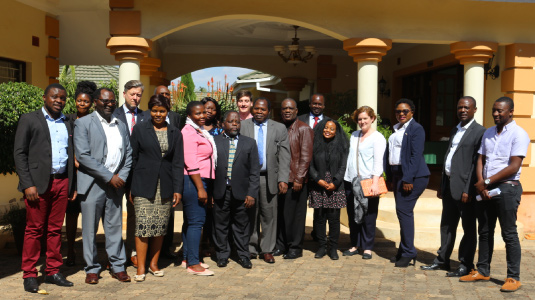SFC news published since 2018. See SFC archived content for earlier news articles.
If the population speaks thirteen different languages, which should be used to teach? Dr Kristinn Hermannsson explains the findings of a GCRF project to inform this debate in Malawi.

 If the population speaks thirteen different languages, which of these should be used to teach in primary schools? Or should all of them be supported? That’s the challenge facing Malawi, a land-locked country of 19 million inhabitants in the South East of Africa that is classed among the least developed by the Organisation for Economic Co-operation and Development’s (OECD) Development Assistance Committee (DAC). Finding the answer is important because there is evidence to suggest that better educational outcomes are achieved if children are taught, at least initially, in their mother tongue and high-quality education is both directly and indirectly associated with the achievement of social and economic development.
If the population speaks thirteen different languages, which of these should be used to teach in primary schools? Or should all of them be supported? That’s the challenge facing Malawi, a land-locked country of 19 million inhabitants in the South East of Africa that is classed among the least developed by the Organisation for Economic Co-operation and Development’s (OECD) Development Assistance Committee (DAC). Finding the answer is important because there is evidence to suggest that better educational outcomes are achieved if children are taught, at least initially, in their mother tongue and high-quality education is both directly and indirectly associated with the achievement of social and economic development.
For the last six months an interdisciplinary research team from linguistics, education, public policy, labour markets and economics has been running a project funded by a Global Challenges Research Fund (GCRF) grant from the Scottish Funding Council to inform this debate in Malawi. Working from Scotland, Malawi and South Africa, the project has explored this conundrum from several perspectives. Preliminary findings where recently presented in a stakeholder workshop in Lilongwe, the capital of Malawi, and the final reports will be published on the project’s website later this month.
Whilst questions about language of instruction are relevant for multilingual societies around the World, Malawi is a particularly interesting case for researchers to focus on. The country has experimented with difference language of instruction policies since the 1960s and the Ministry of Education in Malawi recently adopted an English-only language of instruction policy in the school system. Moreover, the confluence of expert researchers and engaged stakeholders is conducive for high quality applied research.
How to approach language of instruction policies is not straightforward. English is favoured in the labour market and there are practical challenges involved in cultivating so many mother tongues in an under-resourced school system. But the overall effect of this policy on skill-formation and labour market readiness of Malawians is not clear. A priori, it is quite conceivable that the emphasis on English at the expense of mother tongues may undermine children’s education and ultimately be detrimental to the formation of the desired English language skills and labour market readiness.
Ms Vera Kamtukule of the Scotland Malawi partnership has examined the background of the current language of instruction policies. Her findings suggest that whilst policy makers understand the complexity of the issue, short-term urgencies and availability of resources dominate decision making.
Dr Symon Chiziwa from the School of Education in Chancellor College, the University of Malawi, has been analysing the capacity of the Malawian education system to support multiple languages of instruction. He argues that there is strong consensus on the benefits of learning in mother tongue, but that resources constraints are a practical challenge. Moreover, the use of mother-tongue language of instruction is threatened by a perception that it undermines English language learning.
Dr Jean Chavula from the Centre of Language Studies at Chancellor College, the University of Malawi has been examining how teachers cope with language diversity in practice. Based on her preliminary findings, she argued that in practice the Malawian education system is much more multi-lingual than the official policy would imply, as teachers and pupils try to make the most of all the language resources available and interact in all the languages represented in the classroom. Whether such hybrid language of instruction practices are more or less effective than monolingual teaching or mother tongue teaching is not yet clear (although international evidence supports this view).
Professor Lewis Dzimbiri, from the Lilongwe University of Agriculture and Natural Resources, has interviewed employers and found that Malawian work places operate on a mix of local languages and English. With higher cadres dominated by English language use and workers in lower cadres struggling do to a lack of English language skills.
Professor Winford Masanjala from the Department of Economics at Chancellor College has investigated the availability of evidence on the labour market value of language use and Africa. His results show that there is very little evidence to build on from existing data sources. However, recent evidence from Ethiopia suggests that mother tongue instruction in primary schools is important for subsequent labour market outcomes, but ideally instruction should switch to official languages in late primary or early secondary school. Therefore, the issues are not clear cut and evidence is clearly needed to identify the optimal exposure to mother tongue instruction.
The event was hosted by the Scotland Malawi partnership in Lilongwe and attended by invited delegates representing trade unions, employers, government and educational experts.

